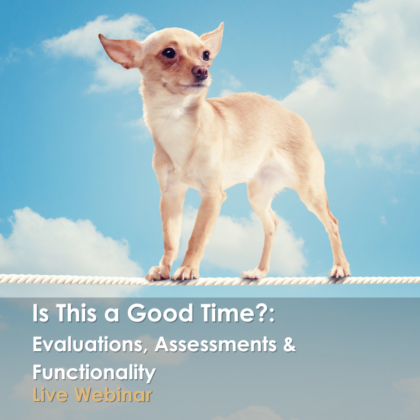This webinar will encourage you to think about assessments and testing in deeper ways, including knowing what you need to know, defining your criteria, and scaling the responses and behaviors you observe. Suzanne’s legendary observation skills and whole-dog approach, plus her FAT app, gives you new tools to understand the dogs in your life.
Assessing behavior and evaluating a dog can be challenging! So many factors play a role in the dog’s behavior that it can be difficult to distinguish a response to environmental or social triggers from a true temperament response or behavior pattern.
How do you know the difference?
There are many ways to evaluate dog behavior and temperament. Not all are effective, not all are humane, and not all are predictive of what the dog is or is not, what the dog may or may not do in a different environment. Because choices for that dog’s life will be made based on an assessment, we need to take great care that we are getting useful, informative answers that are true for that dog. No one wants to get it wrong, and no one wants surprises.
Why is this such a struggle? It may be that we are beginning a bit too far down the line, and missing crucial information that would help us put the dog’s response in context.
Our first question needs to be, “How are you today?”
The answers to that simple question, “How are you today?” require a careful look at the individual and how the dog is functioning in that moment, on that day, across the whole dog: social, cognitive, physiological.
None of us would attempt to assess a dog who was ill, starving, recovering from injury or surgery. And yet the foundation question, “How are you today?” is often missing other than a simple nod to “he’s fine” though the dog may or may not be truly fine.
What we ask those we care about is this question, “Is this a good time?” A person might respond, “No, it’s not. I’m not at my best. I’ve not been sleeping well, the doctor cannot resolve the chronic GI upset, and I have an awful headache this morning.” While a dog cannot tell us that in words, when we carefully assess function as a reflection of well-being, we have a better sense of how that dog is doing.
MORE INFO & REGISTRATION
